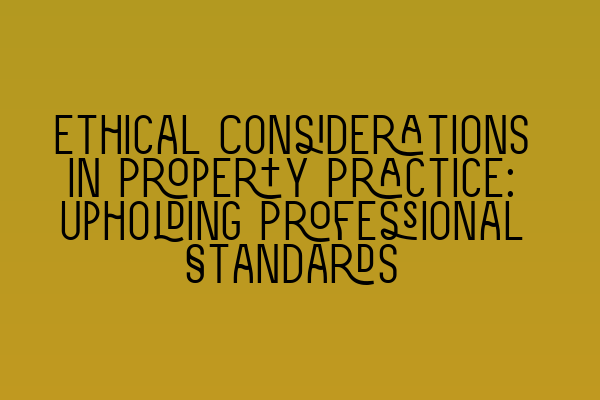Ethical Considerations in Property Practice: Upholding Professional Standards
As property practitioners, it is our duty to not only provide excellent legal services but also to uphold the highest ethical standards in our profession. Ethical considerations play a crucial role in ensuring fairness, integrity, and professionalism in property law practice. In this article, we will explore the key ethical considerations that property practitioners should be aware of and how they can contribute to maintaining professional standards.
1. Confidentiality and Privacy
Confidentiality is a cornerstone of the solicitor-client relationship. Property practitioners must maintain strict confidentiality regarding their clients’ information, ensuring that sensitive details are not disclosed to unauthorized parties. This includes any personal, financial, or legal information shared by the client, which should be treated with the utmost privacy and discretion.
By protecting client confidentiality, property practitioners not only comply with legal obligations but also build trust and confidence with their clients, creating a foundation for a strong working relationship. Remember, breaches of confidentiality can lead to significant consequences, including reputational damage and potential legal action. Upholding confidentiality is non-negotiable.
Related Article:
For a deeper understanding of contractual capacity and its limitations, check out our article on Understanding Contractual Capacity: Rights and Limitations.
2. Conflict of Interest
A conflict of interest arises when a property practitioner’s personal or financial interests may compromise their professional obligations to a client. It is essential to identify and address conflicts of interest promptly to uphold professional standards.
Property practitioners must conduct thorough conflict checks before accepting new instructions or representing multiple clients. This includes assessing whether there are any existing relationships, such as familial or business connections, that could influence their ability to provide unbiased advice and representation.
If a conflict of interest arises, it is the property practitioner’s duty to disclose it to the affected parties and seek their informed consent to proceed. In some cases, it may be necessary to withdraw from representing a client if the conflict cannot be adequately managed.
By recognizing and managing conflicts of interest, property practitioners demonstrate their commitment to maintaining integrity, independence, and professionalism in their practice.
Related Article:
Test your knowledge of contract law and conflict of interest with our interactive SQE mock tests available at Interactive SQE Mock Tests for Contract Law: Test Your Knowledge.
3. Professional Competence
Property practitioners have a duty to provide competent legal advice and representation to their clients. It is essential to stay updated with relevant property laws, regulations, and industry practices and continually improve professional competence.
This can be achieved through ongoing professional development, attending relevant webinars, seminars, and training programs. Maintaining awareness of changes and developments in property law ensures that property practitioners can provide accurate and up-to-date advice to their clients.
Moreover, if a property practitioner encounters a legal issue beyond their expertise, it is important to recommend clients to specialists who can provide the necessary assistance. Upholding professional competence ensures that clients receive the best possible legal support and advice for their property matters.
Related Article:
Enhance your understanding of contract law and other legal topics by joining our SQE Contract Law webinars and gain expert insights and guidance. Check out our schedule at Join Our SQE Contract Law Webinars: Expert Insights and Guidance.
4. Honesty and Integrity
Honesty and integrity are key ethical considerations in property practice. Property practitioners must act with honesty, transparency, and integrity in their dealings with clients, colleagues, and other parties involved in property transactions.
This includes providing clients with accurate and truthful information, such as disclosing all material facts relevant to their property matters, even if it may be unfavorable to the client’s interests. Honesty and integrity build trust and credibility, establishing a strong reputation for the property practitioner and their firm.
In addition, avoiding dishonest or unethical practices, such as providing misleading advice, misrepresenting facts, or engaging in fraudulent activities, is essential to maintain professional standards in property practice. Upholding honesty and integrity is not only an ethical obligation but also a legal requirement.
5. Professional Conduct
Professional conduct encompasses a wide range of ethical considerations, including:
- Respecting the rule of law and promoting access to justice for all
- Treating all parties involved in property transactions with respect, fairness, and impartiality
- Avoiding any behavior that could damage the reputation of the property practitioner or the legal profession
- Complying with all legal and regulatory requirements
By adhering to high standards of professional conduct, property practitioners demonstrate their commitment to maintaining the integrity and reputation of the legal profession.
Related Article:
To gain a deeper understanding of recent changes in contract law and its impact on property transactions, read our article on Contract Law Reforms: An Analysis of Recent Changes.
Conclusion
Upholding professional standards in property practice requires property practitioners to prioritize ethical considerations. By maintaining confidentiality, managing conflicts of interest, demonstrating professional competence, acting with honesty and integrity, and adhering to professional conduct, property practitioners contribute to the trust, fairness, and reliability that clients expect in their legal representation.
At SQE Property Law & Land Law, we are dedicated to upholding the highest ethical standards in property practice. If you have any questions or need legal assistance with your property matters, please don’t hesitate to contact us. Our team of experienced property practitioners is ready to assist you.
